
Contact us ideoszen@gmail.com .... Official Site in greek language www.epicuros.gr
Top News
15th PANHELLENIC SYMPOSIUM OF EPICUREAN PHILOSOPHY 15-16 February 2025 - Athens, Greece
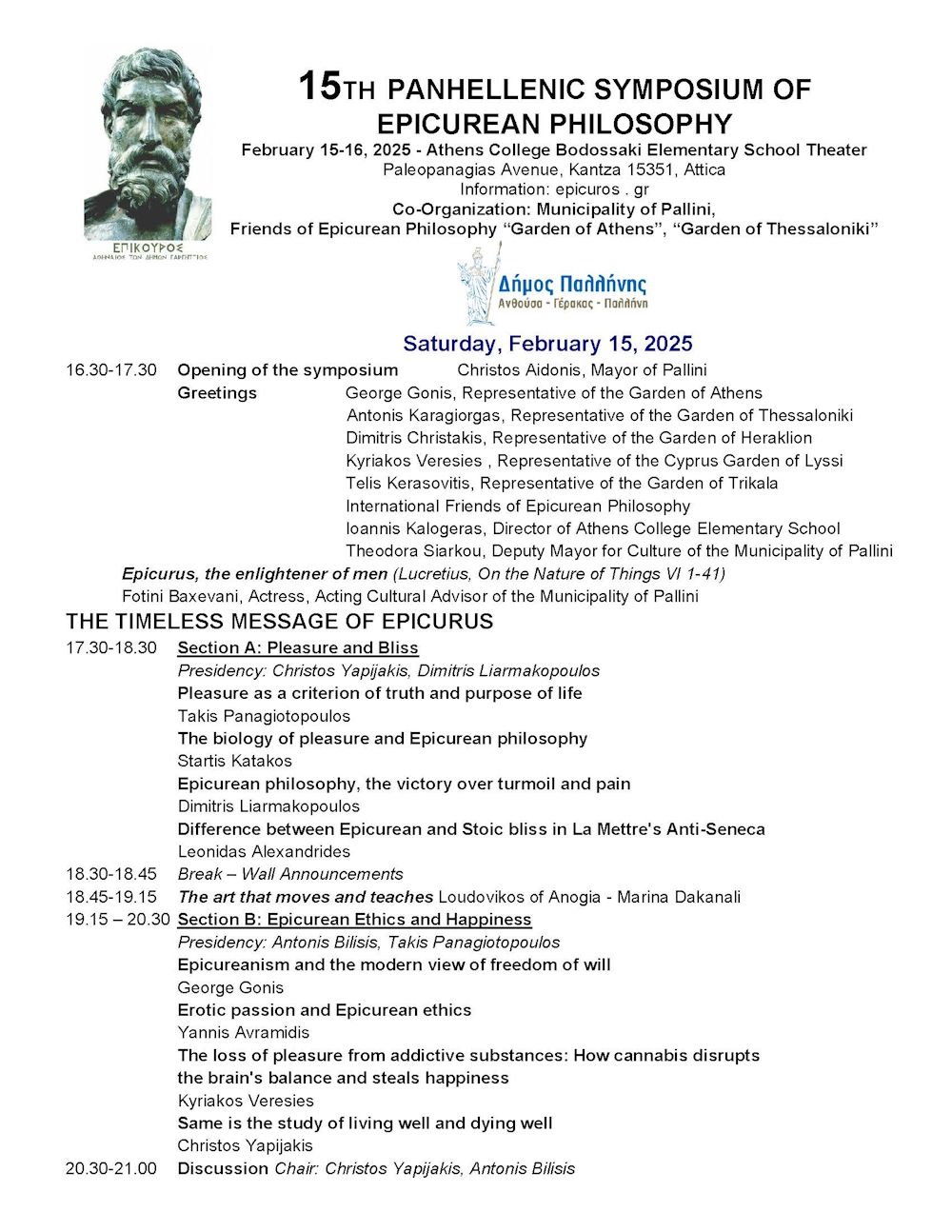
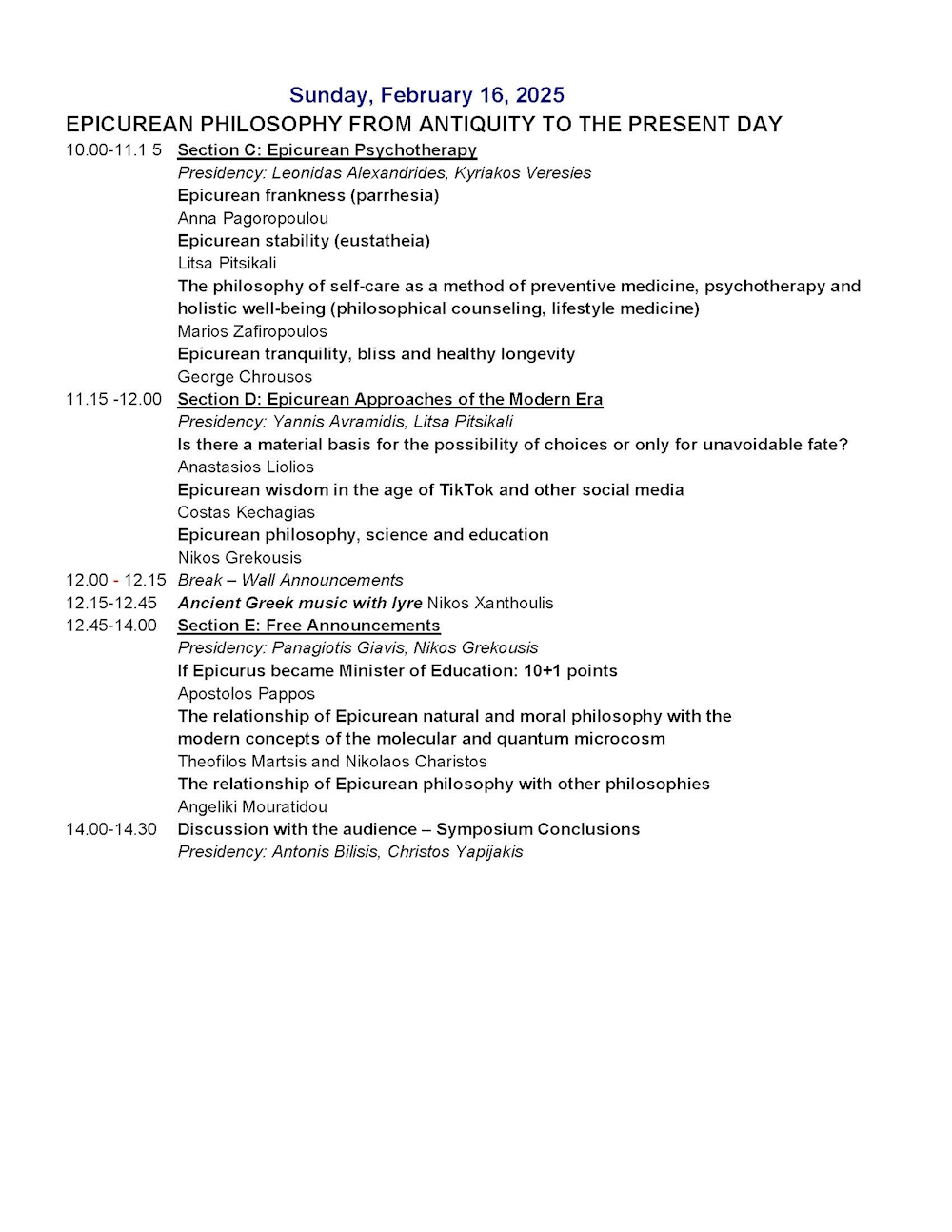
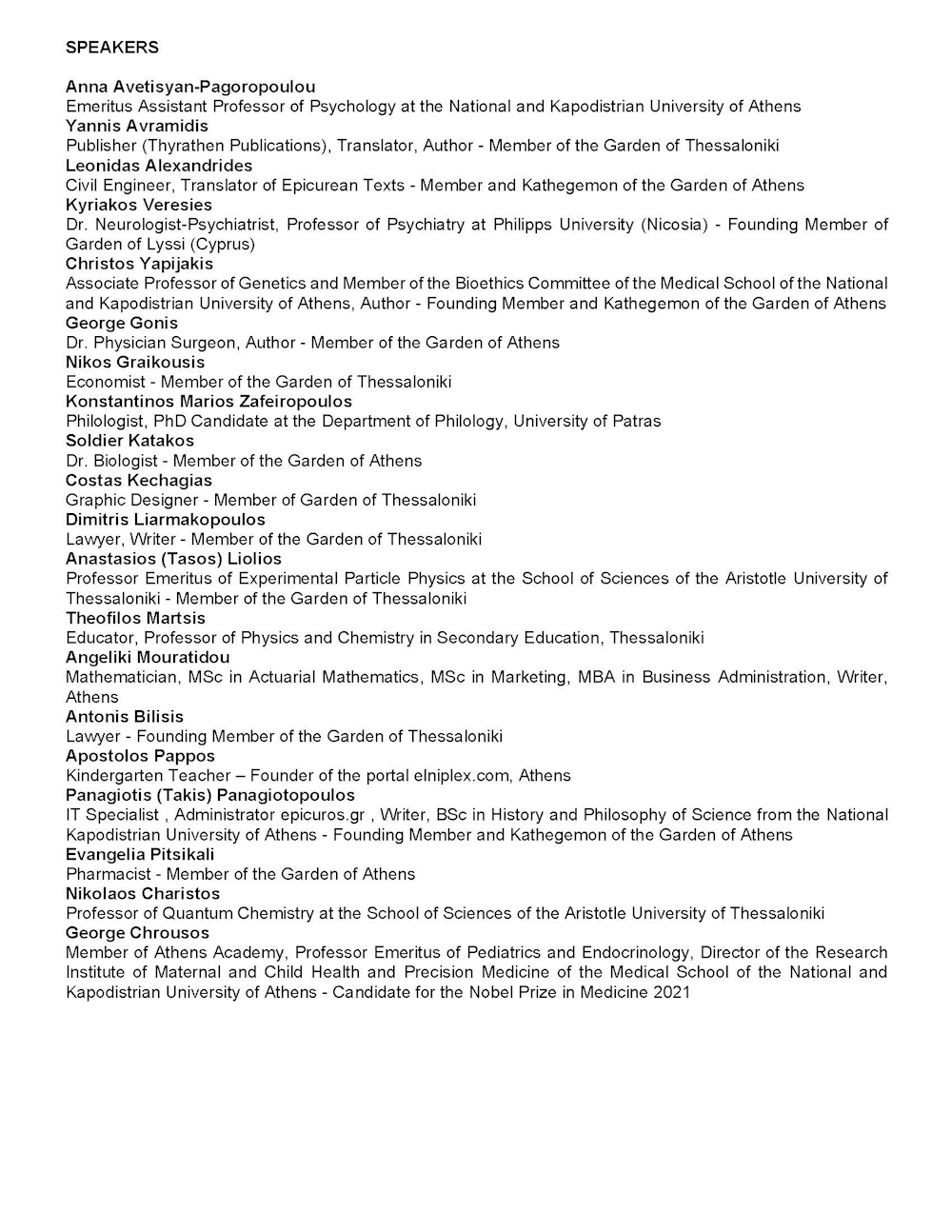

14th PANHELLENIC SYMPOSIUM OF EPICUREAN PHILOSOPHY 17-18 February 2024 - Cultural Center of Pallini, Athens, Greece
A short report and the program
Thomas Jefferson “I too am an Epicurean”: His life and his inspiration from the Ancient Greeks - www.amazon.com by Pan P. founder of www.epicuros.gr and Athens Epicurean Society KIPOS OF ATHENS
The purpose of this book is to highlight the enormous influence of the ancient Greek civilization and Epicurean philosophy on the great historical figure of Thomas Jefferson and, through him, on modern society as a whole. I hope you’ll enjoy this journey into the thoughts and actions of Thomas Jefferson through his life and writings presented from a different aspect. Thomas Jefferson studied the ancient Greek and Greco-Roman civilization and the knowledge gained from that became the foundation for his inspiration and conduct. His excellent command of both Greek and Latin enabled him to read from the original texts; an ability that helped him discern which of the ancient writings led to the transition from the Dark Ages to the Renaissance and the Age of Enlightenment. The most important result of his study was that, by utilizing this knowledge, he shaped himself into an enlightened person with the aim of establishing a free society that would offer everyone the possibility of personal happiness.In a letter, dated October 31, 1823, to the Greek scholar, Adamantios Korais, who was credited with paving the way for Greek Independence, Jefferson wrote:«Nothing is more likely to forward this object than a study of the fine models of science left by their ancestors, to whom we also are all indebted for the lights which originally led ourselves out of Gothic darkness..». Jefferson delved deep into the study of antiquity by examining much of the history, poetry, architecture, and philosophy of that time. However, he clearly showed a preference for a particular philosophical school. In a letter to William Short, dated October 31, 1819, he states:“As you say of yourself, I too am an Epicurean. I consider the genuine (not the imputed) doctrines of Epicurus as containing everything rational in moral philosophy which Greece and Rome have left us”.Jefferson applied his philosophy, both on an individual and collective level, throughout his entire life. He supported the idea that the individual should enjoy a lifestyle through which his mind might be as fulfilled as his body. The pleasure of reading and contemplating upon universal truths through the study of texts was to be accompanied by necessary material goods and exercise to maintain the health of the body. These were the principles through which he aimed to lead humanity on an evolutionary course of exploration to identify the fundamental elements for the creation of a civilization that would ensure the happiness of people more than any other system of his time.To these ends, he was fortunate to be born in the New World, on a continent far away from the ideological chains that held Europe captive and prevented the application of the enlightened and progressive precepts of the time. Distance afforded him to be unaffected by the rivalries between the theocratic Middle Ages and the Renaissance which, despite the important role it played in history, did not manage to transcend its own biases. Jefferson was able to see the ancient world with a clear mind and thus managed to proceed "undefiled" and without hesitation to definitive conclusions concerning the happiness of the individual and that of society in the contemporary epoch. P.P.Athens Epicurean Society News
13th Panhellenic Symposium of Epicurean Philosophy, February 11-12, 2023 Athens, Greece
A top-of-the-world cultural event, the 13th Panhellenic Symposium of Epicurean Philosophy took place on the weekend of 11 and 12 February 2023 with the participation of about three hundred Greeks inspired by the enlightening and humanistic philosophy of Epicurus. This is a unique philosophical conference, as it is the only one organized worldwide dedicated exclusively to Epicurean philosophy. It is also the largest national philosophical conference and the only one in Greece that has been established since 2011 as an institution from the people rather than from the university philosophers. It is organized annually with free entrance for the public by the Municipality of Pallini and the Friends of Epicurean Philosophy "Garden of Athens" and "Garden of Salonica" at the Cultural Center of Gerakas, located within the ancient area of Gargettus, from which the philosopher Epicurus originated from. The previous two Panhellenic Symposia were virtually organized due to the coronavirus pandemic.Read more
12th Panhellenic Symposium of Epicurean Philosophy, February 19-20, 2022 Athens, Greece
Organized by Friends of Epicurean Philosophy Garden of Athens, Garden of Thessaloniki and Municipality of Pallini Under the Auspices of the Region of AtticaLive streaming through www.epicuros.gr
Read more
11th Panhellenic Symposium of Epicurean Philosophy, February 20-21, 2021 Athens, Greece
Organized by Friends of Epicurean Philosophy Garden of Athens, Garden of Thessaloniki and Municipality of Pallini Under the Auspices of the Region of AtticaLive streaming through Zoom/Youtube/Facebook
Read more
A new theatrical play about Epicurus
Christos Yapijakis’ theatrical play “A Happy Greek” (Ένας Ευτυχισμένος Έλληνας). regarding the life, humanism and scientific work of the Athenian philosopher Epicurus, was first published in Greek by 24grammata Publications in 2019. A scene from the play was first performed by amateur actors under the direction of Stavros Spyrakis at the 10th Panhellenic Symposium of Epicurean Philosophy in Pallini, Athens Metropolitan Area, Greece on February 8, 2020. The video of the scene with English subtitles is shown here:
The author Christos Yapijakis is a Founding Member of the Friends of Epicurean Philosophy “Garden of Athens”, Associate Professor of Genetics at the School of Medicine, National Kapodistrian University of Athens and Advisory Board Member of the Applied Philosophy Research Laboratory at the School of Philosophy, National Kapodistrian University of Athens.
10th Panhellenic Symposium of Epicurean Philosophy, February 8-9, 2020, Cultural Center of Pallini, Athens
Free entranceFebruary 8, 2020
THE PHILOSOPHY OF EPICURUS
Greetings from the Gardens of Athens, Thessaloniki, other cities of Greece, International Friends of Epicurus1. PRINCIPLES OF EPICURUS’ PHILOSOPHY
Introduction to Epicurean philosophy – Martela Sinani
Epicurus’ Contibution to Humanity – Takis Panagiotopoulos-Antonis Bilisis
Interval – Viewing of Posters
Scene from theatrical play “A happy Greek” by Christos Yapijakis on Epicurus’ lfe and work
2. EPICURUS’ CONTRIBUTION TO HUMAN THOUGHT
Round Table Discussion – Coordinator: Christos Yapijakis
Epicurus, the humanist philosopher – Theodosis Pelegrinis
Epicurean Biological Ethics – Evangelos Protopapadakis
Epicurean management of stress – George Chrousos
Epicurean Physics: Atoms and Void – Anastasios Liolios Epicurus and Many Worlds in the Universe – Dionysis Simopoulos
Epicurus and Searching for Life in Other Planets – Stamatios Krimigis
Actual symposium (dining, drinking, dancing) in a local tavern with music
February 9, 2020
EPICUREAN PHILOSOPHY FROM ANTIQUITY TO OUR TIMES
3. EPICUREAN PHILOSOPHY AND MODERN ERAEpicurean philosophy and nutrition – Klea Nomikou-Tsantsaridi
Science as a means and as an end in itself – Dimitris Altas
The valuable stones of philosophy – Yannis Avramidis
Interval – Viewing of Posters
4. EPICUREAN PHILOSOPHY IN MODERN GREECE
On the goal of life – Evangelos Michos- Antonis Bilisis
The textbook of the Epicurean sage – Aristotelis Kerasovitis
Epicurean philosophy and everyday life – Minas Patsourakis
The inheritance of a philosophic tradition from ancient era and from modern era – Leonidas Alexandridis
Discussion: “Everlasting contribution of Epicurus in philosophy”
Coordinator: Antonis Bilisis
Modern Texts
A chapter of Epicurean philosophy in Porphyry’s Letter to Marcella

by Elias Tempelis, Professor of Philosophy at the Hellenic Naval Academy, 2019 chrisdar@otenet.gr
Epicurus in Medicine - “HIPPOCRATIC CORPUS WORK “PRECEPTS”:
PHILANTROPY AND UTILITY IN MEDICINE” by Christos Yapijakis, Assistant Professor of Medicine at the Athens Univercity, 2017, cyapijakis_ua_gr@yahoo.com
“Epicurean views on euthanasia (good death)”
by Takis Panagiotopoulos, IT at the City of Athens, 2017, pan_panagiotopoulos@yahoo.gr
“How the portrait of the Athenian philosopher Epicurus became known to us”
by Takis Panagiotopoulos IT at the City of Athens, 2017, pan_panagiotopoulos@yahoo.gr
“The right of happiness in the European Union” - April 14 2019 - ZAPPEION MEGARON - ATHENS - GREECE
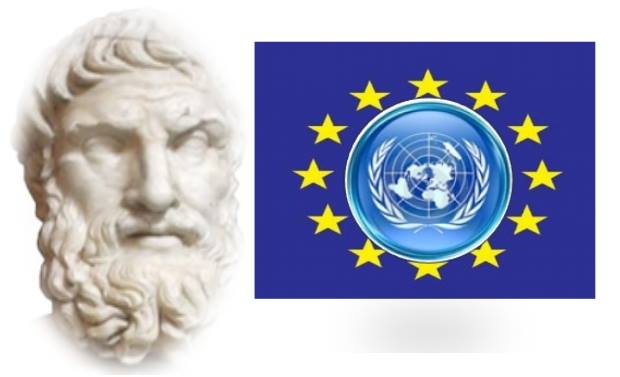
In recent years, there has been accumulating evidence that in almost all European Union countries (including Greece) over 60% of people declare that they do not feel happy or very satisfied with life. The predominant philosophy in the European Union aims at the prosperity of economic figures, favoring policies that cause misery in many European citizens. The right of happiness (well-being) is non-existing in the Charter of Fundamental Rights of the European Union, while if it existed the policies would take it under consideration and there would be a brighter present and future for European citizens.
See more for "The right of happiness in the European Union"....
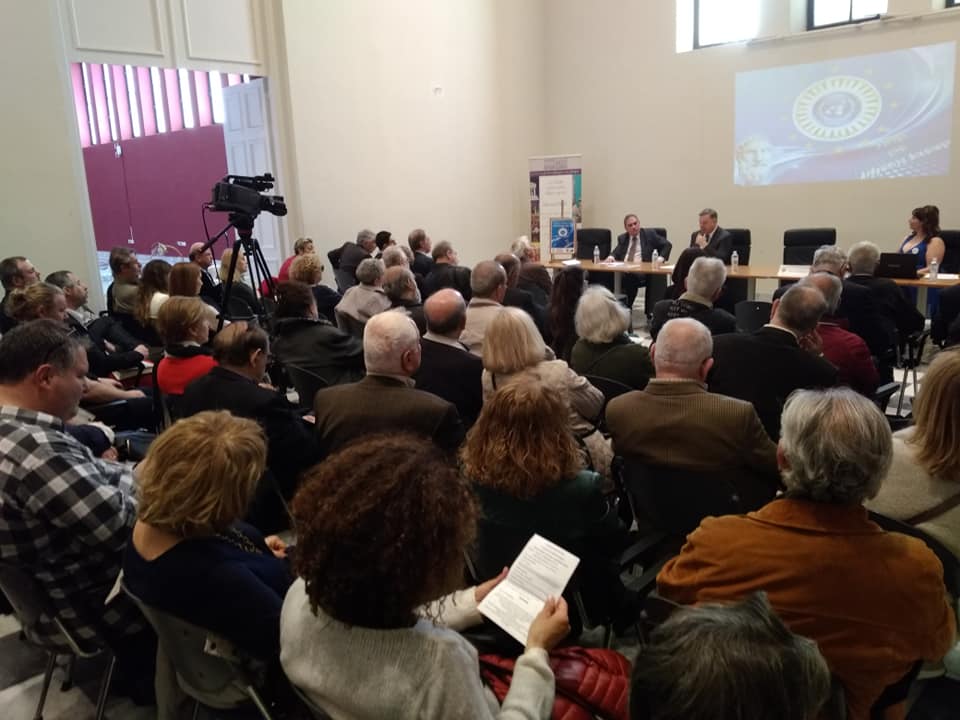 Picture from the meeting at 04/14/2019 C.Yapijakis(Kipos of Athens), G.Petalotis(, Klea Nomikou (Unesco) -
Picture from the meeting at 04/14/2019 C.Yapijakis(Kipos of Athens), G.Petalotis(, Klea Nomikou (Unesco) - 9th Panhellenic Symposium of Epicurean Philosophy, February 9-10, 2019, Cultural Center of Pallini, Athens
Free entrance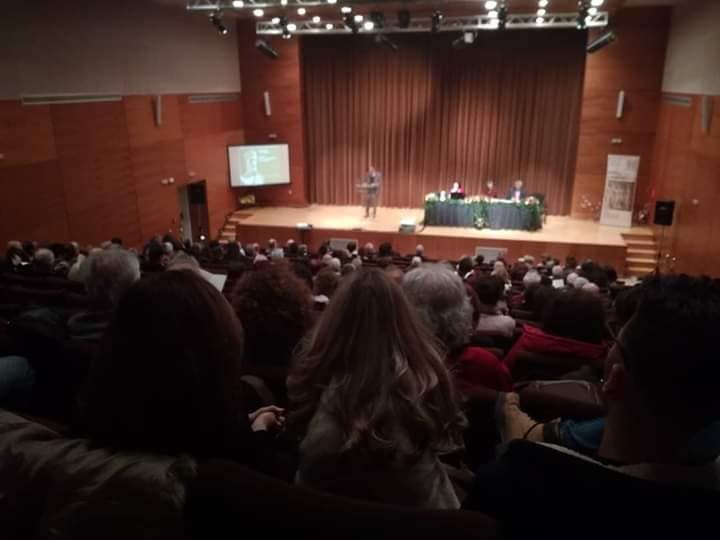
Report
The naturalistic philosophy of Epicurus with friendship and solidarity may lead to happiness
A top-of-the-world cultural event, the 9th Panhellenic Symposium of Epicurean Philosophy took place on the weekend of 9 and 10 February 2019 with the participation of hundreds of Greeks inspired by the enlightening and humanistic philosophy of Epicurus. This is the only philosophical conference in Greece that has been established since 2011 as an institution from the people rather than from the university philosophers. It is organized annually with free entrance for the public by the Municipality of Pallini and the Friends of Epicurean Philosophy "Garden of Athens" and "Garden of Salonica" at the Cultural Center of Gerakas, located within the ancient area of Gargettus, from which the philosopher Epicurus originated from.
In great contrast to the modern crisis of values, the diffuse psychopathology and the divisive political climate displayed by most mass media, the Symposium revealed the naturalistic, humanistic and psychotherapeutic message of Epicurus aiming to achieve a happy life with friendship and solidarity, even in difficult times.
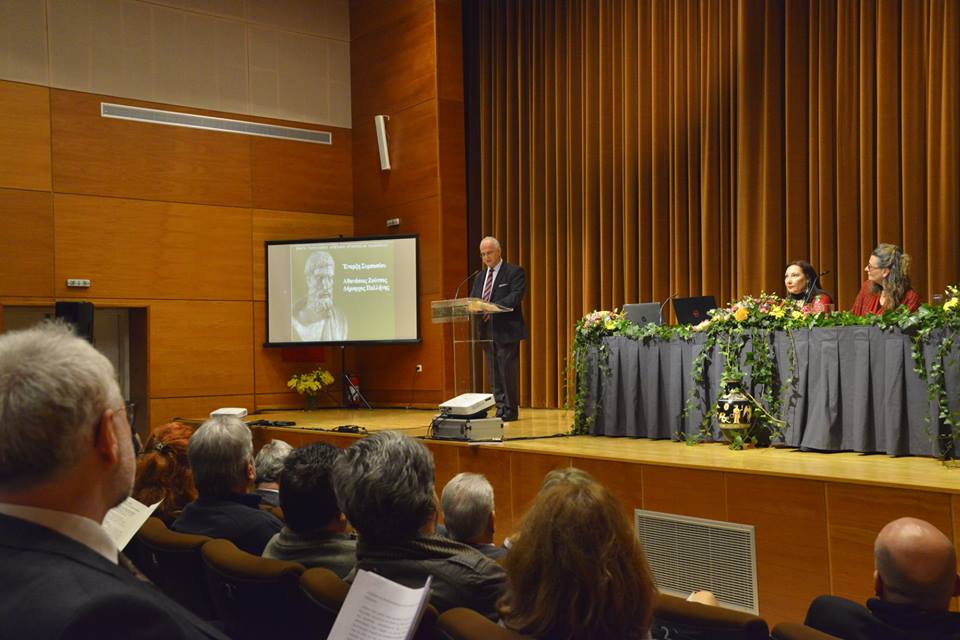
The commencement of the Symposium was held by the Mayor of Pallini, Athanasios Zoutsos, followed by greetings from friends from all over the world and Greece.
Distinguished members of the “Gardens” made important speeches, among which it is worth mentioning “the global need for a new Enlightenment” by Takis Panagiotopoulos and the Epicurean saying that "we should truly philosophize and not pretend to philosophize" by Dimitris Liarmakopoulos, while the Professor of Physics Tasos Liolios described the “Epicureal natural way for a happy life” and the Honorable Ambassador Georgios Nicolaidis discussed “the Epicurean approach to Diplomacy”.
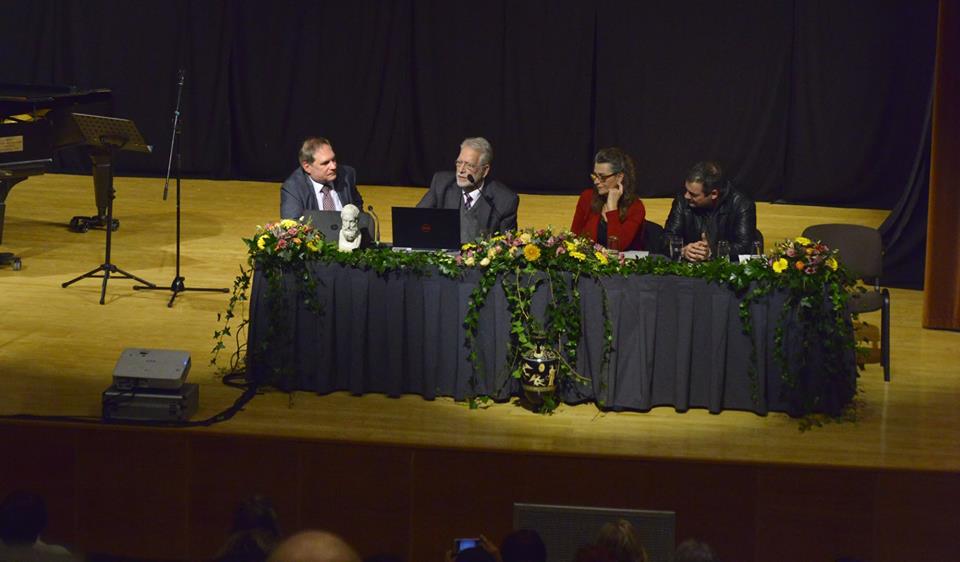
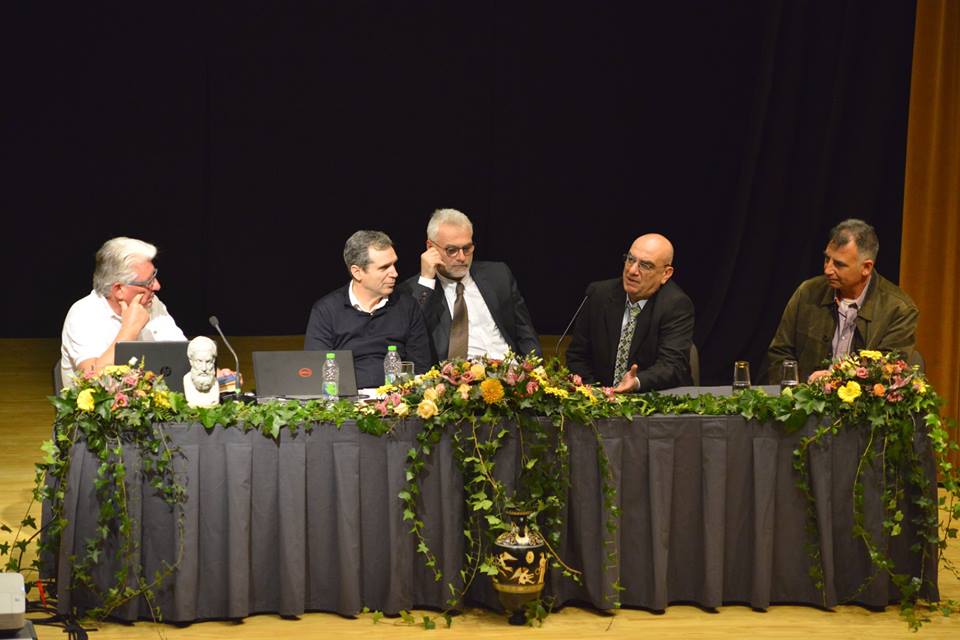
The Symposium was attended by distinguished academics with important announcements, such as the Professor of Philosophy Elias Tempelis who revealed a new ancient Epicurean text of four pages for the first time in the world, the Director of the Athens Epigraphic Museum, Athanassios Themos, who made an original presentation of Epicurean philosophical inscriptions in Greece, the Professor of Political Philosophy Theodoros Georgiou who observed that the modern era demand for solidarity of the people has its philosophical root in Epicurus, the Assistant Professor of Applied Philosophy Evangelos Protopapadakis who underlined the Epicurean approach to bioethics with the aim of benefiting people, the Emeritus Professor of Medicine Georgios Chrousos who analyzed the control of stress and Epicurean mental equilibrium, and the founding member of the “Garden of Athens” Assistant Professor of Medicine Christos Yapijakis who referred to the sociopolitical prejudices that Epicurean prudence may prevent.
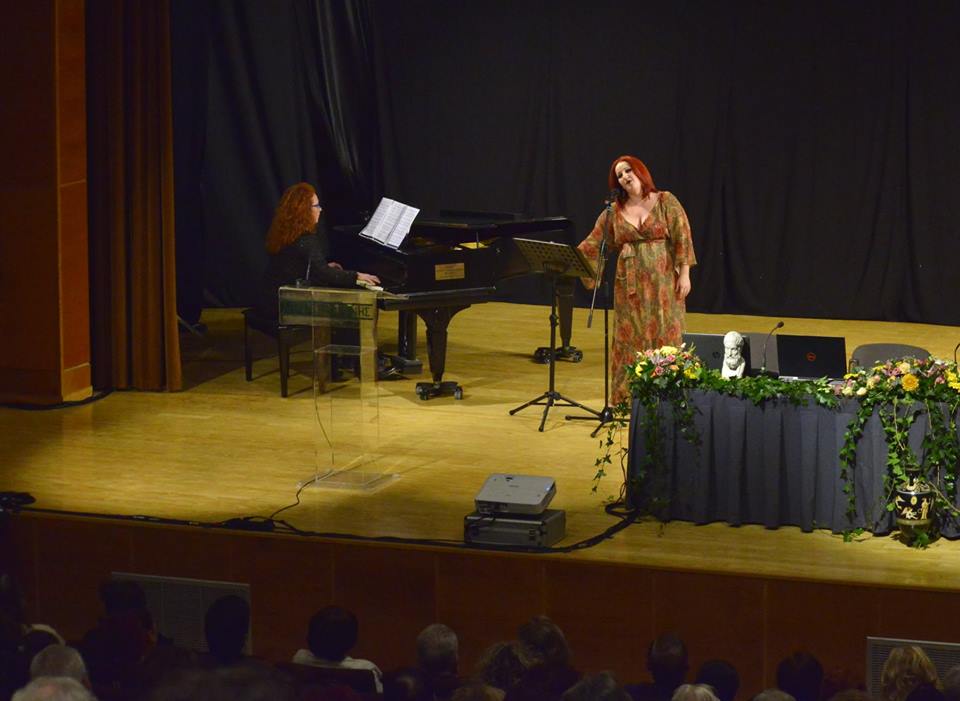
In the artistic part of the Symposium, the soprano Agapi Papamitsou made an enchanting performance of classical songs accompanied by pianist Maria Andreadakis, while an excerpt of the new film "He always laughed" by the famous director Theodoros Marangos, about the difficult life of comedian actor Kostas Tsakonas, caused spontaneous laughter, strong emotions and reflection in the audience.

The 9th Panhellenic Symposium of Epicurean Philosophy gave its participants an opportunity for an experiential approach to Epicurean philosophy, which offers a timeless mental armor against social, cultural and economic deadlocks of humanity.
9th Panhellenic Symposium of Epicurean Philosophy - Program
February 9, 2019THE PHILOSOPHY OF EPICURUS
Greetings from the Gardens of Athens, Thessaloniki, Trikala, Chalkis (Greece), International Friends of Epicurus
1. PRINCIPLES OF EPICURUS’ PHILOSOPHY
Poetic praise of Epicurus by a Modern Epicurean
Introduction to Epicurean Philosophy
Epicurean Ethics in Lucretius
Epicurean Inscriptions in Greece
Interval: Viewing of Posters
Music Interval: Classical songs about Happiness
Agape Papamitsou (soprano coloratura) accompanied by piano
2. EPICUREAN APPROACH TO NEUROBIOLOGY AND BIOETHICS
Mistakes of cognitive perception and Epicurean prudence
Epicurean philosophy and Bioethics
Control of stress and Epicurean stability (“eustatheia”)
The natural way to happiness
Discussion: “Biological ethics: The Epicurean perspective”
Actual symposium (dining and drinking) in a local tavern with music
February 10, 2019
EPICUREAN PHILOSOPHY FROM ANTIQUITY TO OUR TIMES
3. EPICUREAN PHILOSOPHY AND OTHER PHILOSOPHIES
A chapter of Epicurean philosophy in the letter "To Markella" of the Neoplatonic philosopher Porphyry
Aristippus and Epicurus: Differences and similarities
We should not pretend to philosophize
“He always laughed” (segment of a film by Theodoros Maragos)
Interval: Viewing of Posters
4. EPICUREAN PHILOSOPHY AND POLIS
The Epicurean approach to diplomacy
The social swerve of the Epicureans
The social need for a new Enlightenment
Epicureans and politics
Epicurus as a political philosopher today
Discussion: “Society and politics: The Epicurean perspective”
10 years of the GARDEN OF ATHENS: Celebration of a Decade of Pleasure
January 10, 2019, 'MELINA' Cultural Center of City of Athens
Free entrance
In a crowded hall of the Athenian Cultural Center "Melina", shaped to remind of the beauties of Athens in the first half of the 20th century, the 10th anniversary of the foundation of the “Garden of Athens” by the Friends of Epicurean Philosophy was celebrated on Thursday, January 10, 2019, at a festive event under the auspices of the City of Athens.
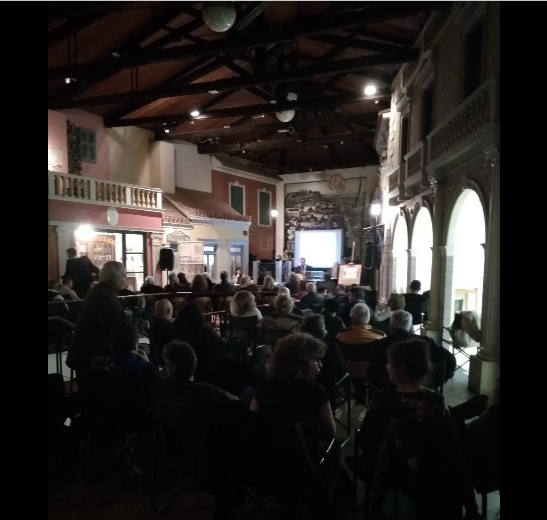
The event was coordinated by Eleni Kapralou, a lawyer and Member of the “Garden of Athens”. At first, the Founding Members of the “Garden of Athens”, Christos Yapijakis, geneticist, and Takis Panagiotopoulos, computer informatician, rememberd how they had met in Gargettus (the place of Epicurus’ origin) in January 2009 and had agreed to establish the “Garden of Athens”, which was in the first semester limited at meetings of 5-10 people in a coffee house. They confessed that their motivation was the pleasure of a free and friendly philosophical discussion every week, and at that time they did not imagine the great success of the actions of the “Garden of Athens” in the years to come.
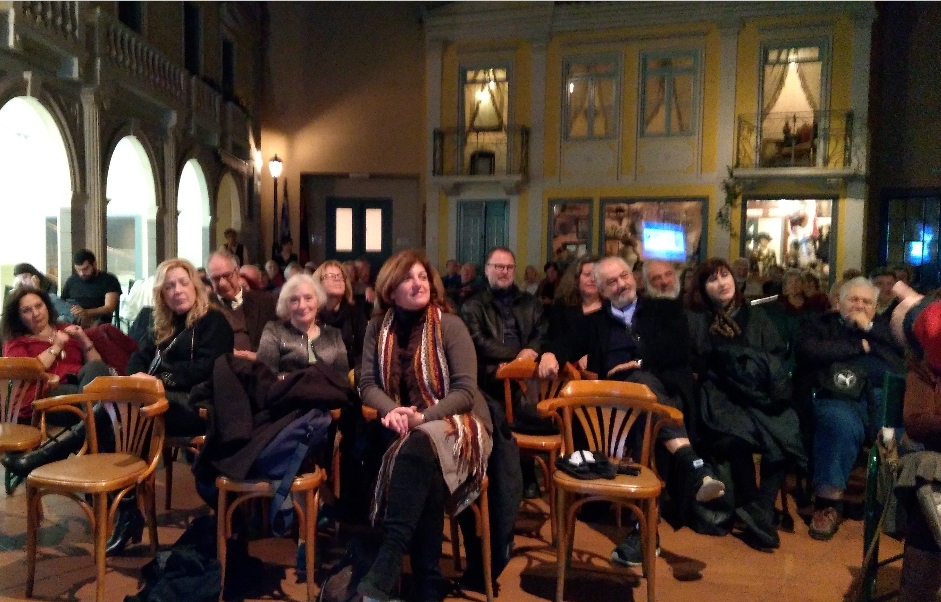 On behalf of the Mayor of Athens Giorgos Kaminis, the event was greeted by the Mayor’s consultant Stratis Katakos, a biologist and graduate of the Epicurean Philosophy Lessons of the “Garden of Athens”. Cordial greetings for The 10th anniversary of the “Garden of Athens” were sent by the Friends of the Epicurean Philosophy from other cities of Greece: on behalf of the Garden of Thessaloniki Antonis Bilisis, on behalf of the Garden of Chalkis Minas Patsourakis and on behalf of Garden of Trikala Aristotelis Kerasovitis.
On behalf of the Mayor of Athens Giorgos Kaminis, the event was greeted by the Mayor’s consultant Stratis Katakos, a biologist and graduate of the Epicurean Philosophy Lessons of the “Garden of Athens”. Cordial greetings for The 10th anniversary of the “Garden of Athens” were sent by the Friends of the Epicurean Philosophy from other cities of Greece: on behalf of the Garden of Thessaloniki Antonis Bilisis, on behalf of the Garden of Chalkis Minas Patsourakis and on behalf of Garden of Trikala Aristotelis Kerasovitis.
Greetings to the “Garden of Athens”, were sent by Hiram Crespo on behalf of the International Society of Friends of Epicurus, and Cassius Amicus, the American administrator of the website Newepicurean.com.
The event was also addressed by university professors. Stephen Greenblatt, Professor of Humanities at Harvard University, USA, and award-winning author of the book "Swerve: How the world became modern", sent a message stating that he had been the beneficiary of the therapeutic power of Epicurus’ teaching, through the mediating eloquence of Lucretius, and thrilled about the range of events of the “Garden of Athens”. Additionally, a video was shown with Professor Greenblatt explaining the cultural swerve made by the discovery of the great poem of Lucretius, which contributed to the birth of the modern world (video). Evangelos Protopapadakis, Assistant Professor of Applied Philosophy at the University of Athens sent a message expressing admiration for the visionaries who started a decade ago a beautiful philosophical journey, improving themselves and benefiting the society to which their activities were opened without a trace of elitism. Elias Tempelis, Professor of Philosophy at the Naval Academy of Greece, welcomed the event, noting that his mutually beneficial participation in the Panhellenic Symposium of Epicurean Philosophy gave him the opportunity to research and bring to light the influence of the Epicurean Philosophy through Gassendi and Lock in the Greek Enlightenment of the 18th century, as well as the reference of Epicurean views in Greek philosophy textbooks of the 19th century. In addition, Professor Tempelis mentioned that at a recent International Conference in Britain he presented a speech about the revival of the Epicurean philosophy in modern Greece in the last decade, which impressed those who heard it.
The Emeritus Professor of Medicine at the University of Athens George Chrousos sent a greeting message to the event and, as an internationally renowned researcher on physiology and pathology of stress, underlined the Epicurean concepts “eustatheia” (stability), “eudaimonia” (happiness) and "psyches therapeia" (psychotherapy) that as Epicurus democratically suggested they can be approached by all people. Anna Pagoropoulou, Assistant Professor of Psychology, addressed the event referring to the two speeches he had made in two Panhellenic Symposia of Epicurean Philosophy on Psychotherapy and Art Photography, and to the relationship between the teaching of Epicurus and modern Positive Psychology.
In her address, Aspasia Papadoperaki, an internationally renowned sculptor and awarded by the Athens Academy of Arts, a Friend of the Epicurean Philosophy and designer of the banner of “the Garden of Athens”, spoke emotionally about the four-year period of being a Member of the “Garden of Athens”, during which she was taught, discussed and experienced a lot. The occasion of her invitation to the Panhellenic Symposium of Epicurean Philosophy was the publication of her book “The Epicurean poet C.P. Cavafy", while the fruit of her interaction with the Friends of the “Garden of Athens” was her book "Lucretius in Vitsentsos Kornaros’ Erotokritos and the era in his poetry". At the end of her greeting, with obvious emotion Aspasia Papadoperakis wished the 100 years anniversary of the foundation of the “Garden of Athens” to be celebrated by newer generations, when we will not exist.
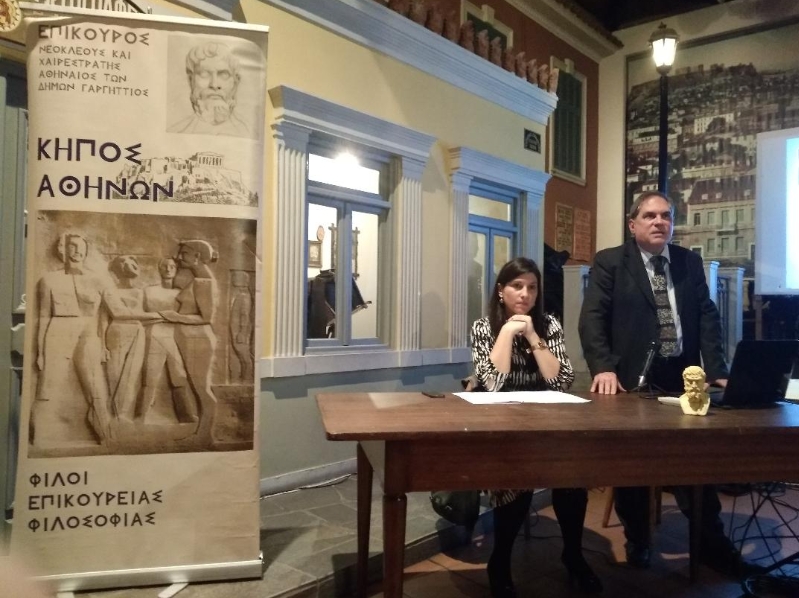
Christos Yapijakis, Founding Member of the “Garden of Athens”, spoke about “The Epicurean Philosophy and the Modern Garden of Athens”, while Takis Panagiotopoulos, Founding Member of the “Garden of Athens” and administrator of the website epicuros.com presented “Memories of the Decade of the Garden of Athens”.
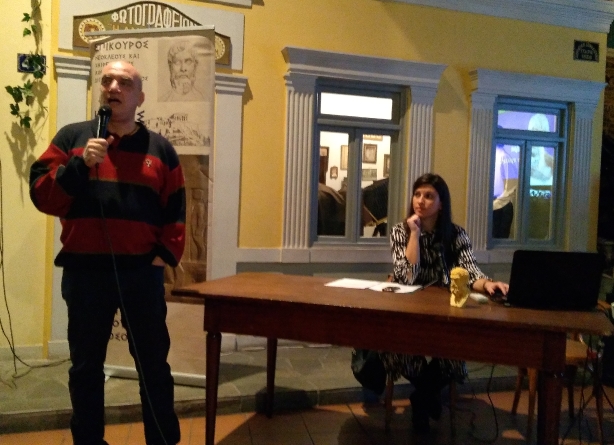
Between presentations, the renown talented and highly loved by the Greek public actor Gerassimos Gennatas recited verses of the Roman Epicurean poet Lucretius in two passages titled “Epicurean Living Pleasantly” and “Lucretius’ Praise to Epicurus”. In the last part of the evening, Marios Strofalis, the well-known, talented and beloved music composer for cinema, television and theater, charmed the audience as a piano soloist with five of his great melodies. One of these pieces from the European Taxim collection, the composer had previously played at a Panhellenic Symposium of Epicurean Philosophy video.

It was enchantingly hedonistic for all the attending people who experienced it, this combination of the wonderful music, the beautiful nostalgic environment of Athens of the last century and the mental pleasures offered by the references to Epicurean Philosophy and the ten-year actions of the “Garden of Athens”. The common impression of everyone was that there is hope even in the modern world, which is full of absurdity, insecurity and misery, when people with wisdom and friendship come together, assist each other and pursue together the common utility and happiness.

8th Panhellenic Symposium of Epicurean Philosophy
February 10-11, 2018, Cultural
Center of Pallini, Athens
Free entrance
The Symposium is annualy organized, with free entrance, by the Friends of Epicurean Philosophy Garden of Athens and Garden of Thessaloniki under the auspices of the Municipality of Pallini. The Pan-Hellenic Symposium of Epicurean Philosophy takes place every year in February, because Epicurus was born in that month, and always in Pallini, because that particular municipality of modern Athens metropolitan area includes the ancient Athenian demos of Gargettus, from which Epicurus originated.
Program
February 10, 2018
THE PHILOSOPHY OF EPICURUS
Greetings from the Gardens of Athens, Thessaloniki, Trikala, Chalkis, Imathias (Greece), International Friends of Epicurus
1. PRINCIPLES OF EPICURUS’ PHILOSOPHY
Praise of Epicurus by a Roman Epicurean
Introduction to Epicurean Philosophy
2. EPICUREAN THERAPY OF PSYCHE
Epicurean psychotherapy with frank criticism
Philodemus “On anger”
Lack of freedom of the dependent person and the epicurean liberation of his mind
Control of stress and Epicurean philosophy
Interval: Viewing of Posters
Music Interval: Greek songs involving Celestial bodies
3. EPICURUS AND FREEDOM
Free will in Epicurean philosophy
Free human being: a course from darkness to light
“Potentially” (segment of a film by Theodoros Maragos)
Discussion: “Mental health, freedom and happy living”
Actual symposium (dining and drinking) in a local tavern with music
February 11, 2018
EPICUREAN PHILOSOPHY FROM ANTIQUITY TO OUR TIMES
4. EPICUREAN HISTORY
Important difference of sage and friendship between Epicurus and Plato
Focusing of thought into an impression as criterion of truth
Montaigne and epicurean pleasure
Reception of Epicurus by Greeks in Vienna during Enlightenment
Critique by Lenin to Hegel’s critique of Epicurus
Death in texts of Philodemus and Lucretius
Interval: Viewing of Posters
5. EPICUREAN PHILOSOPHY AND SOCIETY
An Epicurean politician
Epicurus and economic theory
The Epicurean philosophy as a fence against misinformation
6. EPICUREAN PHILOSOPHY AND ART
Epicurean philosophy and poetry
Criteria for Art according to Philodemus
Artistic photography and Epicurean philosophy
Discussion: “Socially happy life”
7th Panhellenic Symposium of Epicurean Philosophy
February 11-12, 2017, Cultural Center of Pallini, Athens:A Report by C.Yapijakis
For the seventh consecutive year since 2011, more than 400 people from all over Greece, a new record of participants, gathered at the Cultural Center of Pallini in Athens in order to attend the two-day Pan-Hellenic Symposium of Epicurean Philosophy.
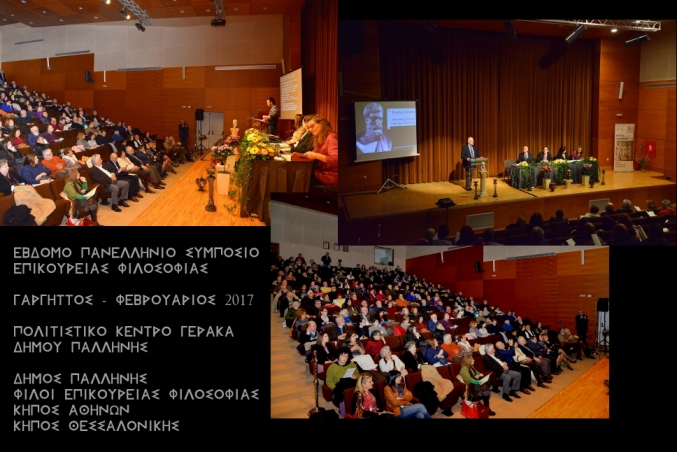
The 7th Pan-Hellenic Symposium of Epicurean Philosophy was unanimously a great success and took place in a warm friendly atmosphere, despite the cold weather. There were two sessions on the first day and two sessions on the second day of the Symposium with 19 oral presentations, two discussions, 6 poster presentations, as well as three artistic intervals.
At the opening session of the first day on Saturday, February 11, 2017, the Mayor of Pallini Athanassios Zoutsos said that a website with the Declaration of the Right of Happiness in the European Union has been launched (www. eudaimonia.eu) with information regarding a future campaign of collecting signatures in order to bring the issue to the EU parliament. The initial greetings of representatives from the Greek Gardens were followed by the friendly greetings from Hiram Crespo (International Society of Friends of Epicurus), from Geoff Petersson (Garden of Sydney, Australia), and from Cassius (newepicurean.com, USA).
Session 1 PRINCIPLES OF EPICURUS PHILOSOPHY started with a hymn to Epicurus written by Lucretius and beautifully recited by actor Giorgos Klonis. Then, the presentations ”Life of Epicurus” by Christina Toumba and “ The philosophy of Epicurus” by Kostas Triantafyllidis covered a broad introduction for those attendants with limited knowledge of Epicurus and his philosophy.
Session 2 LUCRETIUS AND SCIENCE was dedicated to the 600 years anniversary of the discovery of the manuscript of Lucretius' masterpiece “On the nature of things” (1417-2017), and its influence to natural philosophy and science. All presentations showed the scientific verification of Epicurean concepts. “Lucretius and Physics” covered by Giannis Alexakis who covered among other things the Brownian motion and the uncertainty principle, “Lucretius and Astronomy” by Fiori Metallinou showed the vastness of the universe and multiplicity of worlds, “Lucretius and Biology” by Christos Yapijakis discussed evolution of living organisms by natural selection, neurobiology, laws of genetics and extraterrestrial life, “Lucretius and Psychology” by Anna Pagoropoulou revealed the similarity of Epicurean ethics with cognitive psychotherapy, and “Lucretius and Sociology-Criminology” by Erasmia Bitsika illustrated the crime prevention capability of the Epicurean philosophy.
The Session was followed by guitar playing by Antonios Erimos of musical pieces “Dust in the wind” (Kansas, USA), “La vita è bella” (Nicola Piovanni, Italy), “Imagine” (John Lennon, UK), “A felicidade” (Antonio Carlos Jobim, Brazil), while at the same time the lyrics translated in Greek were shown.
Session 3 EUZOIA (GOOD LIFE) AND EUTHANASIA (GOOD DEATH) started with presentation “Epicurean views on euthanasia (good death)” by Takis Panagiotopoulos who discussed Epicurus' death and the Epicurean attitude that a good life leads to a good death. Evangelos Protopapadakis discussed the “Epicurean, Stoic and Kantian views regarding suicide”, while Dimitris Liarmakopoulos spoke about good life without the fear of death. Finally, a live discussion on the matters of good life and good death kept the audience until 10 pm, when it was interrupted so that the Friends of Epicurean Philosophy could participate in an actual symposium with dining, drinking, and dancing in a nearby taverna .
On Sunday, February 12, 2017, the Symposium started with Session 3 EPICUREAN HISTORY that included two talks, “The Stoic Epictetus against Epicurus” by Babis Patzoglou and “The hetera philosopher Leontion” by Kostas Kalevras.
Session 4 EPICUREAN PHILOSOPHY AND SOCIETY had many very interesting talks. Antonis Bilisis “On education” referred to the importance of introducing the teaching of the Epicurean Canon in Greek high school, so that younger generations be may able to develop a critical way of thinking and approaching reality. Panos Alexandropoulos discussed “Epicurus and Maslow: On needs and desires” showing the similarities between the two thinkers. The American professor Gerald Gutenschwager spoke in Greek regarding “Epicurus and social theory” analysing by an Epicurean point of view the last fifty years of social movements, and focusing on cultural creatives of the last twenty years. “Epicurean view” by Giorgos Kaplanis showed that an advice in an Epicurus' letter might be viewed in different context by different people who do not see the whole picture. Dimitris Altas discussed thoroughly the subject of the “Declaration of happiness in the European Union: conditions and consequences” illustrating that it is of great importance for the future destination of the European Union for the benefit of its people. The Session was followed by an artistic interval in which the Dutchman Francesco Bertels played some selected piano and accordion pieces, while the enthusiastic audience sang along.
The final Session 5 PRESENT AND FUTURE OF EPICUREAN PHILOSOPHY included presentations “Thoughts of the Garden of Athens” by Litsa Pitsikali and “Thoughts of the Garden of Thessaloniki” by Aphrodite Kouroudi. Litsa discussed the proposal of publishing an english book of the best presentations of the 7 Panhellenic Symposia, as well as the vision to organize in 2020 the first International Symposium of Epicurean Philosophy in Athens. Aphrodite mentioned the intended publication of a short version of the Epicurean Canon in an effort to propose its teaching in Greek high school.
The following discussion stirred the audience of the Symposium about several issues. When someone asked the question why Epicureans are not acting politically to change the dire situation in Greece, the easy answer was that we are doing great many things with open access (conferences, open meetings, books, websites) in order to inform as many people as possible so that they may critically change their mentality. The paradigm of the discovery of Lucretius' poem six hundred years ago was mentioned as a text that changed the course of the Western world. The Epicurean philosophy helped people in ancient times and during the Enlightenment and modern times to make themselves and their environment better.
From the six poster presentations, that were viewed during the intervals of the Symposium, the audience seemed to discuss more the following: - “Sociobiology and Epicurean altruistic egoism: From selfish gene to human cooperation” by Christos Yapijakis - “The discovery of Lucretius' De rerum natura” by Takis Panagiotopoulos
The Program
February 11, 2017
THE PHILOSOPHY OF EPICURUS
Greetings from the Gardens of Athens, Thessaloniki, and other cities of Greece, International Friends of Epicurus
1. PRINCIPLES OF EPICURUS’ PHILOSOPHY
Life of Epicurus
Lucretius “On the nature of things” (excerpt recitation)
The philosophy of Epicurus
2. LUCRETIUS AND SCIENCE (1417-2017)
Lucretius and Physics
Lucretius and Astronomy
Lucretius and Biology
Lucretius and Psychology
Lucretius and Sociology - Criminology
Interval: Viewing of Posters
Music Anthology by Antonios Erimos (guitar): Dust in the wind (Kansas), La vita e' bella (Nicola Piovani), Imagine (John Lennon), A felicidade (Antonio Carlos Jobim)
3. EUZOIA (GOOD LIFE) AND EUTHANASIA (GOOD DEATH)
Epicurean views on euthanasia (good death)
Philosophical views on euthanasia
Epicurean euzoia (good life)
Discussion: “Euzoia (good life) and euthanasia (good death)”
Actual symposium (dining, drinking, dancing) in a local tavern with music
February 12, 2017
EPICUREAN PHILOSOPHY FROM ANTIQUITY TO OUR TIMES
4. EPICUREAN HISTORY
The Stoic Epictetus against Epicurus
The hetera philosopher Leontion
Interval: Viewing of Posters
Music Anthology by Francesco Bertels: Selected piano works
5. EPICUREAN PHILOSOPHY AND SOCIETY
On education
Epicurus and Maslow: On needs and desires
Epicurus and social theory
Epicurean view
Declaration of happiness in the European Union: conditions and consequences
6. PRESENT AND FUTURE OF THE EPICUREAN PHILOSOPHY
Thoughts of the Garden of Athens
Thoughts of the Garden of Thessaloniki
Discussion: “Present and Future of the Epicurean Philosophy”
WORLD CONGRESS IN PHILOSOPHY (WCP 2016) “THE PHILOSOPHY OF ARISTOTLE”
Athens, 9-15 July, 2016
Aristotle and his influence on later philosophy
"The influence of Aristotle in Epicurus' modification of atomic physics"
Christos Yapijakis
since October 2017